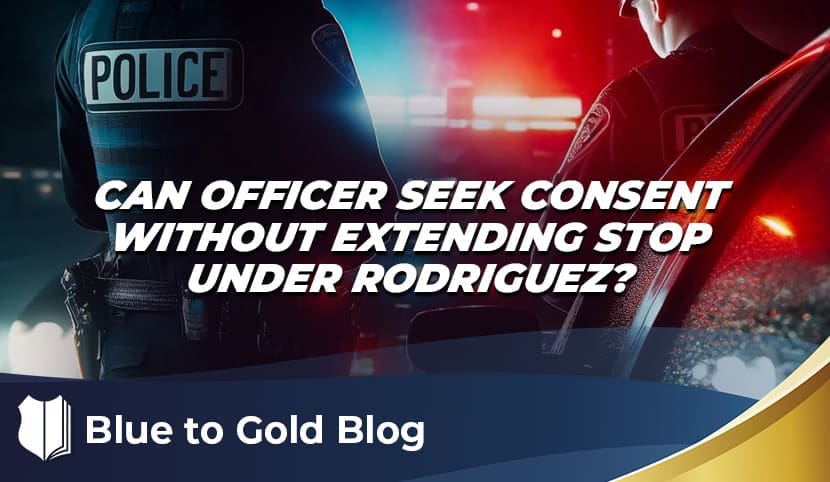I’ve got another great question from an officer in Surprise, Arizona, and I want to share it with you and provide my feedback.
The question is: “Can officers still ask for consent to search a vehicle during a traffic stop without it being considered an extension of the stop for an unrelated reason, which would violate the Rodriguez decision?”
The answer is yes, officers can still ask for consent to search a vehicle. This does not violate the Rodriguez decision, and here’s why.
First, a little context: The Rodriguez decision, from 2015, states that if officers extend a stop for an unrelated reason, it violates the Fourth Amendment, and any evidence obtained may be suppressed. That makes sense. In the Rodriguez case, the officer extended the stop by seven minutes to run a canine search without any reasonable suspicion, even though the traffic stop was already concluded. Rodriguez was let go but was then detained when he refused consent for the dog search.
However, the Rodriguez decision has not been interpreted to mean that any unrelated questioning automatically violates the Fourth Amendment. Instead, courts are focused on whether the officer’s actions measurably extend the stop in a way that cannot be justified under the Fourth Amendment’s reasonableness standard. Fortunately, courts are not interpreting Rodriguez in a way that says any question unrelated to the stop is an automatic violation.
In many cases, courts are attempting to find a balance. For example, if an officer approaches a vehicle after pulling someone over for speeding and asks for a license, registration, insurance, or questions like “Do you have any weapons or illegal items in the car?”—those questions are fine. They don’t violate the Fourth Amendment because they don’t measurably extend the stop. Additionally, many courts view these questions as related to safety concerns during the traffic stop. It is beneficial for an officer to know if a person is carrying a weapon or transporting narcotics, for example, as this is a safety issue.
Even if courts don’t directly mention safety, the questioning still does not extend the stop. This same logic applies to consent searches. Rodriguez is not violated if the driver or passengers consent to extending the stop, whether for a search or other unrelated questioning. The issue arises when an officer extends the stop on their own, especially if it’s intrusive. For instance, if a stop is made for a faulty blinker and the officer asks a series of unrelated questions, such as those leading into a drug investigation, this can extend the stop unnecessarily. If this happens, it may violate the Fourth Amendment, and the evidence could be suppressed.
That said, in some states like Minnesota and Oregon, the rules are slightly different due to restrictions on traffic stops, but this is not the case in the other 48 states.
I hope this clarifies things. Stay safe, keep the questions coming, and until next time.








